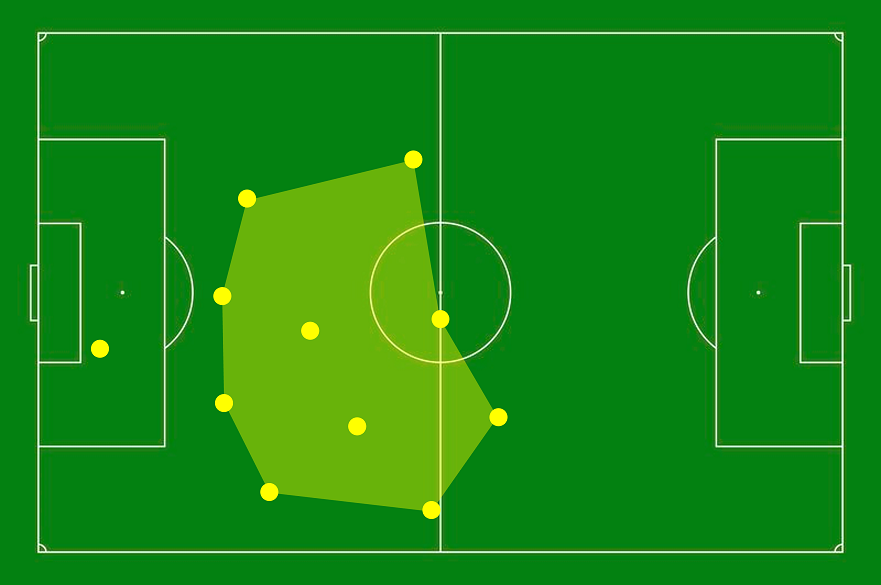COVID-19 lockdown impacted performance of top-flight footballers, study suggests
La Liga footballers played in more compact spaces and covered less distance in matches following the COVID-19 lockdown in Spain, a new study shows.
By Dave Rogers | Published on 5 July 2022
Categories: Press office; Research; School of Science and Technology;

Sports scientists at Nottingham Trent University and the University of Extremadura in Spain, in collaboration with Mediacoach – LaLiga researchers, investigated how the first lockdown affected Spanish top-flight teams physically and tactically.
Analysing data from performances pre and post lockdown, which occurred midway through the 2019-2020 season, they found a general decrease in positional and physical measurements of players.
Defensively, teams were more compact in terms of length and width, covering 18 square metres less on average in the games post-lockdown.
Off the ball, which would include tactical or positional play, players ran three metres less per minute, and high-speed running – occurring in key moments during the match – averaged almost half a metre less per minute.
The surface area of a team or group of players provides insight into the space that players are covering at a specific moment and their compactness and can be measured by researchers using a polygon generated by all the players.
The researchers argue that the effect may be due to the fact that players were unable to train as a team during lockdown, which would have left them tactically underprepared.
They say that less training time and less time working collectively on predetermined tactics may have led teams to play a more compact game to avoid potential costly mistakes.
Players may also have shown a decrease in physical performance compared to the pre-lockdown period because they were less able to respond to the demands of the game having not undertaken football-specific training with teammates
Even home advantage for teams – which were playing without crowds post-lockdown – appeared to diminish, as defensive area covered, total distance covered and high-speed running, all decreased when comparing pre and post lockdown.
The COVID-19 pandemic had a considerable impact on competitive football across the world as fixtures were cancelled or postponed, causing substantial periods without training or matches.
The researchers say the findings could prove useful in future as coaches design and improve training plans for similar situations in which their teams return to competition after an unusual period with no training.
“The pandemic led to an unusual situation in football in which the lockdown entailed a period of no training followed by a congested fixture schedule,” lead researcher Dr Javier Fernandez Navarro, a sports scientist and performance analyst in Nottingham Trent University’s School of Science and Technology.
He said: “We wanted to use the data to evaluate the effect of the pandemic on teams’ tactical behaviour and running performance and our work shows how teams played in smaller spaces and covered less distance following the first COVID-19 lockdown in Spain.
“One of football’s key defensive tactical principles is that teams should be compact in defence to protect their own goal; we believe teams may have increased the compactness of players in defensive and attacking phases as a result of being less well prepared.
“Although footballers could train individually during the pandemic, they could not train with their teammates and could not keep improving the tactical aspects of their play. Our findings help us to understand the impact of an unusual event such as interruption to fixtures on teams’ performance and could be useful for coaches in future.”
The study is published in the journal Science and Medicine in Football.
Notes for Editors
Press enquiries please contact Dave Rogers, Public Relations Manager, on telephone +44 (0)115 848 8782, or via email.
About Nottingham Trent University
Nottingham Trent University (NTU) received the Queens Anniversary Prize for Higher and Further Education in 2021 for cultural heritage science research. It is the second time that NTU has been bestowed the honour of receiving a Queen’s Anniversary Prize for its research, the first being in 2015 for leading-edge research on the safety and security of global citizens.
The Research Excellence Framework (2021) classed 83% of NTU’s research activity as either world-leading or internationally excellent. 86% of NTU’s research impact was assessed to be either world-leading or internationally excellent.
NTU was awarded Outstanding Support for Students 2020 (Times Higher Education Awards). It was the University of the Year 2019 (Guardian University Awards, UK Social Mobility Awards), Modern University of the Year 2018 (Times and Sunday Times Good University Guide) and University of the Year 2017 (Times Higher Education Awards).
NTU is the 5th largest UK institution by student numbers, with over 33,000 students and more than 4,000 staff located across five campuses. It has an international student population of 4,000 and an NTU community representing around 160 countries.
In the past 15 years, NTU has invested £450 million in tools, technology and facilities.
NTU is in the UK’s top 10 for number of applications and ranked first for accepted offers (2019 UCAS UG acceptance data) It is also among the UK’s top five recruiters of students from disadvantaged backgrounds.
75% of NTU students go on to graduate-level employment or graduate-entry education / training within fifteen months of graduating (Guardian University Guide 2021).
NTU is 4th globally (and 3rd in the UK) for sustainability in the 2021 UI Green Metric University World Rankings (out of more than 900 participating universities).